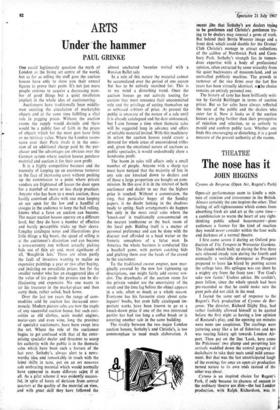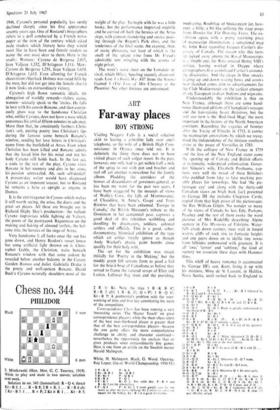THEATRE
The nose has it
JOHN HIGGINS
Cyrano de Bergerac (Open Air, Regent's Park) Open-air performances seem to kindle a mix- ture of stoicism and irreverence in the British. Almost certainly the one inspires the other. That feeling of self-righteousness which comes from absorbing fresh air and art at the same time-- a combination to warm the heart of any right- thinking public school housemaster—gives audiences a licence for the kind of reaction they would never consider within the four walls and darkness of a normal theatre.
I first came across it during an Oxford pro- duction of The Tempest in Worcester Gardens. The clouds which built up during the first three acts released steady rain during the fourth and eventually a veritable downpour as Prospero prepared to leave his island by punting across the college lake. His epilogue was cut short by a mighty cry from the front row: 'For God's sake row faster.' Useless advice. He couldn't, poor fellow, since the whole speech had been pre-recorded so that he could make sure the punt pole did not stick in the mud.
I feared the same sort of response to the Regent's Park production of Cyrano de Ber- gerac. The director, Richard Digby Day, had rather foolishly allowed himself to be quoted before the first night as having a low opinion of Rostand's play, and the opening ten minutes were none too auspicious. The starlings were yattering away like a lot of fishwives and BEA was roaring lickety spit towards London Air- port. Then pat on the line 'Look, here come the Precieuses' two plump and perspiring late arrivals waddled down the central gangway of deckchairs to take their seals amid mild amuse- ment. But that was the last unanticipated laugh of the evening; for once an open-air production turned nature to its own ends instead of the other way about.
Cyrano is an inspired choice for Regent's Park, if only because its chances of success in the ordinary theatre are Slim—the last London production, with Ralph , Richardson, was in 1946. Cyrano's personal popularity has surely declined sharply since his first appearance seventy years ago. One of Rostand's biographers refers to a poll conducted by a French news- paper at the turn of the century which asked male readers which literary hero they would most like to have been and female readers to name the one most dear to them. Here is the result: Women : Cyrano de Bergerac 2,817, Jean Valjean 1,332, D'Artagnan 1,115. Men : Cyrano de Bergerac 1,751, Jean Valjean 1,659, D'Artagnan 1,615. Even allowing for French chauvinism (Sherlock Holmes was rated fifth by the men, but did not get into the female charts) it now looks an extraordinary victory.
Cyrano's high flown romantic ideals, his abnegation of worldly rewards—riches, status, women—scarcely speak to the 'sixties. He falls in love with his cousin Roxane, and then courte- ously gives way to the handsome Christian who, unlike Cyrano, does not have a nose which announces his arrival fifteen minutes in advance. More than that, he consistently furthers Chris- tian's suit, putting poetry into Christian's lips during the famous scene beneath Roxane's window, sending her love letters in Christian's name from the battlefield at Arras. Even when Christian has been killed and Roxane admits that she loved him for his mind and not his body Cyrano still holds back. In the last act, a coda to the rest of the play, Cyrano visits Roxane in her nunnery and dies in her arms, his passion unrevealed. Ah, such self-denial! A present-day writer would have diagnosed Cyrano as an impotent 'voyeur, but to Rostand he remains a hero as upright as anyone in Dumas.
It is the extravagance in Cyrano which makes it still worth seeing", the arias, the duets and the great set pieces. All these are brought out in Richard Digby Day's production: the ballade Cyrano improvises while fighting de Valvert, the poem of the pastrycook Ragueneau on the making and baking of almond tartlets, the bal- cony trio, the heroics of the siege of Arras.
Very handsome it all looks once the sun has gone down, and Henry Bardon's russet house has some artificial light thrown on it. Chris- topher Gable, the Christian, waits beneath Roxane's window with that same ardour he revealed below another balcony in the Covent Garden Romeo and Juliet. Gabrielle Drake is the pretty and well-spoken Roxane. David Buck's Cyrano naturally shoulders most of the
weight of the play. To begin with he was a little husky, but the performance improved mightily and he carried off both the heroics of the ,Arras siege, with cannon thundering and smoke pour- ing through the Regent's Park elms, and the tenderness of the final scene. An evening. then. of many pleasures, not least of which is the smell of the spiced wine from Mr Freud's admirable tent mingling with the aroma of night privet.
The week's score sheet on the Lonsdale re- vival, which Hilary Spurling recently discussed. reads Lost I tAren't We All? from the Savoy) Gained I (The Law of Mrs Cheyney at the Phoenix). No other fixtures are announced.































 Previous page
Previous page